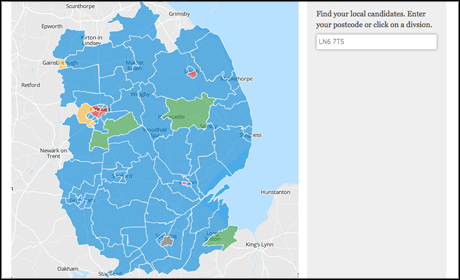
The Lincolnite has partnered with a local developer to build an interactive map for the county council elections that will become a real-time representation of the results as they are announced.
The map features information, including a photograph and manifesto where available, on more than 300 candidates in the 77 districts holding elections, allowing browsers to search using their postcode or by coloured districts.
"I'd say it can be quite challenging for small organisations to put something like this together," Daniel Ionescu, managing editor at the Lincolnite, told Journalism.co.uk, "but we believe the calibre of the map is on par with anything you'd see from a national."
Ionescu said interactives and online features, as well as iBooks and apps, are central to The Lincolnite's identity as a digital native publication.We believe the calibre of the map is on par with anything you'd see from a nationalDaniel Ionescu, Lincolnite
"We included photos, we included links to their manifesto, you can click through neighbouring areas, you can put your postcode, all of the other solutions that I've seen," said Ionescu.
"We believe that ours is the most comprehensive in this respect in terms of the complete information for readers".
Local software developer Alex Bilbie, who describes himself as a "big advocate" for open data, built the map for the Lincolnite from scratch.
"The map itself is principally built using open data from the ordnance survey and the Royal Mail," Bilbie told Journalism.co.uk, "that's how we got the electoral boundaries and also how we learnt to convert a postcode into a latitude and longitude which can then be used to zoom into particular electoral divisions."
Bilbie and Ionescu then researched the candidates and manually entered information relating to their candidacy, manifesto and political affiliations. As election results are announced this evening, the map will reflect the outcome live.

"As of this evening, the map is going to blank itself out and be a neutral colour all over," he continued, "then as results come in it will start to repopulate the map. We'll have the live numbers coming in and the map will essentially update in real-time as the results come in throughout the night. We'll also have a 'balance of power' bar across the top."
Bilbie and other staff at the Lincolnite will be able to enter the raw data, he said, and the map will update the rest of the features automatically – which of the 77 districts have been won by which candidates and how that affects the percentage control of the county council between the particular parties.
"As far as we're aware no one has ever done this before quite in this way, certainly not in Lincolnshire", Bilbie said.
"We're struggling to find examples anywhere else in terms of a real-time interactive map of the political make up of a particular area. Especially such a large area as well."
Bilbie has already published details on how he built the map on his personal blog, and will be giving more details on the real-time elements and lessons learned after the elections as part of his commitment to open data.
"In my opinion if this information and data is made available to everyone then people can go out and interpret things for themselves rather than having politicians or journalists tell them the facts for them," he said.
The Lincolnite has seen monthly browsing figures rise from around 50,000 visitors in April 2012 to more than 80,000 leading up to the elections, a result which Ionescu puts down to smart digital strategy.
"We tend to be image-led, we tend to be snappy," he said. "When it's required we tend to be more in depth. We're also quite well versed in social media and interacting with our readers that way and people tend to appreciate that."
In the past Ionescu and his team have used Google Maps and Listly to create interactive features, such as crowd-ranked lists of Lincoln's fish and chips shops or guides to polling stations, play areas and Roman historical sites, and he hopes to continue to improve this side of the site.
Local elections, which Lincoln hold every year instead of once every four years like elsewhere, are "going to be one place where we are using this again and improving the format based on the feedback we have this time round," Ionescu added.
Free daily newsletter
If you like our news and feature articles, you can sign up to receive our free daily (Mon-Fri) email newsletter (mobile friendly).
Related articles
- Weekly journalism news update: How to 'unbias' the news, interactive timelines and solutions-based photojournalism
- Tool for journalists: Timetoast, for creating interactive timelines of events
- New interactive map helps you find constructive journalists around the world
- Have you heard the news? You can now talk to the New York Times
- The Guardian Mobile Innovation Lab built an audio player to make podcast listening on mobile more interactive









